All pictures and captions come from the RIA Novosti archive / Wikipedia
![“The defenders of Stalingrad”. Right: General Andrei Yeryomenko, Commander of the Red Army's Southeast [Stalingrad] Front. Second right: Alexei Chuyanov, First Secretary of the Soviet Communist Party's Stalingrad Regional Committee. Third right: General Alexei Kirichenko, Member of the Military Council of Stalingrad Front in Charge of Military Logistics. Fourth right: Nikita Khrushchev, Member of Politburo of Central Committee of the Soviet Communist Party, First Secretary of Central Committee of the Communist Party of Ukraine.](https://www.warhistoryonline.com/wp-content/uploads/2015/02/800px-RIAN_archive_882837_The_defenders_of_Stalingrad-640x429.jpg) “The defenders of Stalingrad”.
Right: General Andrei Yeryomenko, Commander of the Red Army’s Southeast
[Stalingrad] Front. Second right: Alexei Chuyanov, First Secretary of
the Soviet Communist Party’s Stalingrad Regional Committee. Third right:
General Alexei Kirichenko, Member of the Military Council of Stalingrad
Front in Charge of Military Logistics. Fourth right: Nikita Khrushchev,
Member of Politburo of Central Committee of the Soviet Communist Party,
First Secretary of Central Committee of the Communist Party of Ukraine.
“The defenders of Stalingrad”.
Right: General Andrei Yeryomenko, Commander of the Red Army’s Southeast
[Stalingrad] Front. Second right: Alexei Chuyanov, First Secretary of
the Soviet Communist Party’s Stalingrad Regional Committee. Third right:
General Alexei Kirichenko, Member of the Military Council of Stalingrad
Front in Charge of Military Logistics. Fourth right: Nikita Khrushchev,
Member of Politburo of Central Committee of the Soviet Communist Party,
First Secretary of Central Committee of the Communist Party of Ukraine.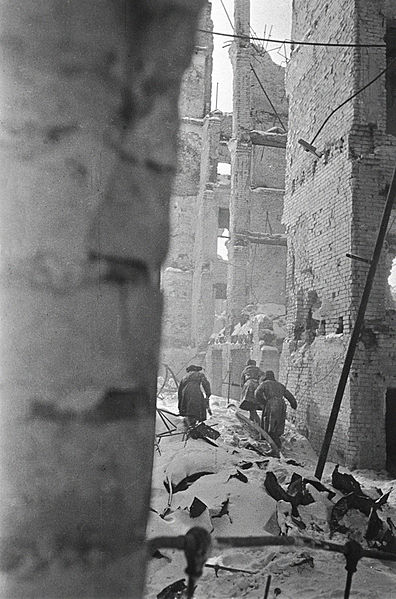 “Destroyed Stalingrad”. Soviet soldiers making their way through the ruins of Stalingrad.
“Destroyed Stalingrad”. Soviet soldiers making their way through the ruins of Stalingrad.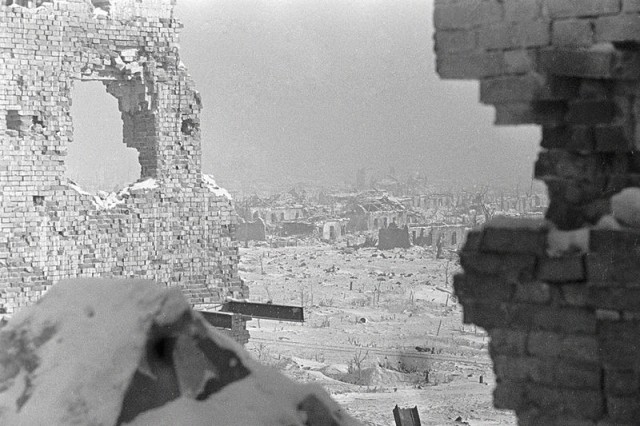 “Destroyed Stalingrad does not give up”. Destroyed Stalingrad does not give up!
“Destroyed Stalingrad does not give up”. Destroyed Stalingrad does not give up!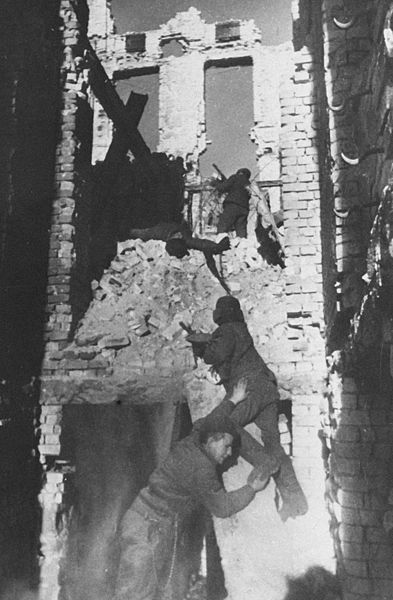 “Battle of Stalingrad”. Soviet soldiers during a street fight in Stalingrad.
“Battle of Stalingrad”. Soviet soldiers during a street fight in Stalingrad.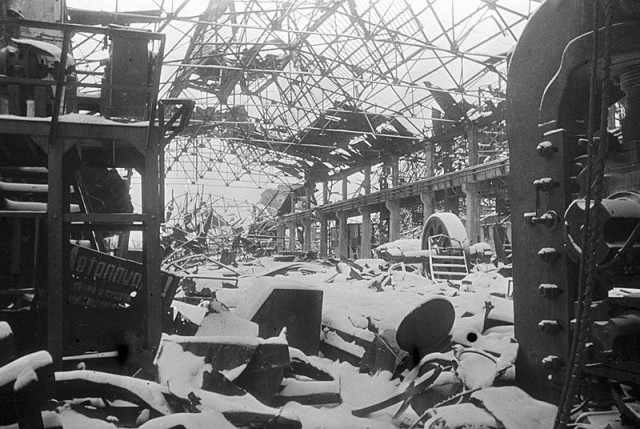 “The ruins of Stalingrad”. A destroyed workshop after bombing.
“The ruins of Stalingrad”. A destroyed workshop after bombing.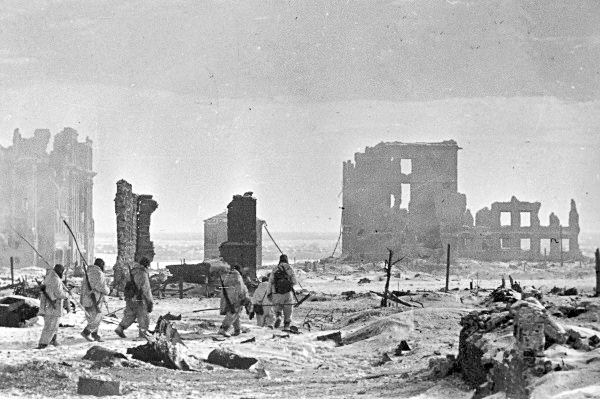 “Center of Stalingrad after liberation”. The center of the city of Stalingrad after liberation from the German occupation.
“Center of Stalingrad after liberation”. The center of the city of Stalingrad after liberation from the German occupation.The German offensive to capture Stalingrad began in late summer 1942 using the 6th Army and elements of the 4th Panzer Army. The attack was supported by intensive Luftwaffe bombing that reduced much of the city to rubble. The fighting degenerated into building-to-building fighting, and both sides poured reinforcements into the city. By mid-November 1942, the Germans had pushed the Soviet defenders back at great cost into narrow zones generally along the west bank of the Volga River.
Adolf Hitler ordered that the army stay in Stalingrad and make no attempt to break out; instead, attempts were made to supply the army by air and to break the encirclement from the outside. Heavy fighting continued for another two months. By the beginning of February 1943, the Axis forces in Stalingrad had exhausted their ammunition and food. The remaining elements of the 6th Army surrendered.The battle lasted five months, one week, and three days.
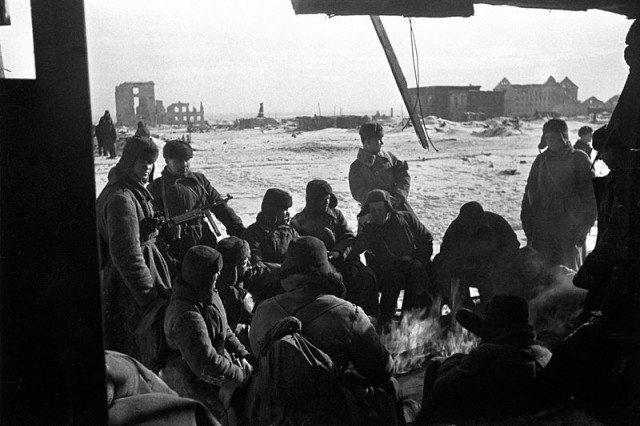 “Stalingrad soldiers during short lull”. Troops during a lull in the Battle of Stalingrad,
“Stalingrad soldiers during short lull”. Troops during a lull in the Battle of Stalingrad,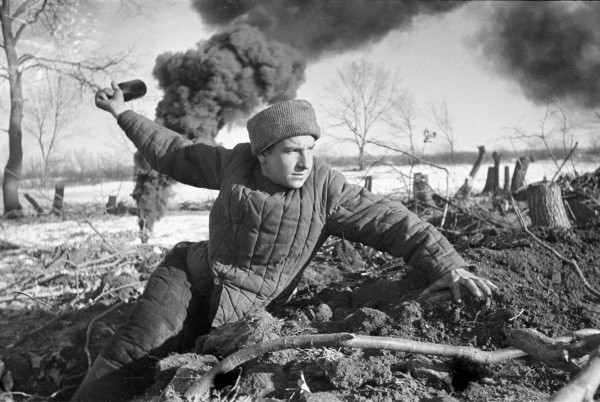 “Throwing grenades”. A soldier prepares to throw a grenade.
“Throwing grenades”. A soldier prepares to throw a grenade.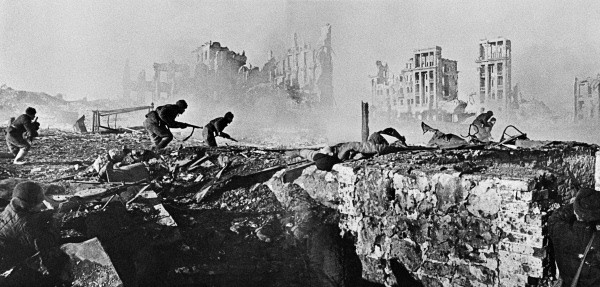 “Soviet soldiers attack”. Soviet soldiers on the attack on the house, Stalingrad.
“Soviet soldiers attack”. Soviet soldiers on the attack on the house, Stalingrad.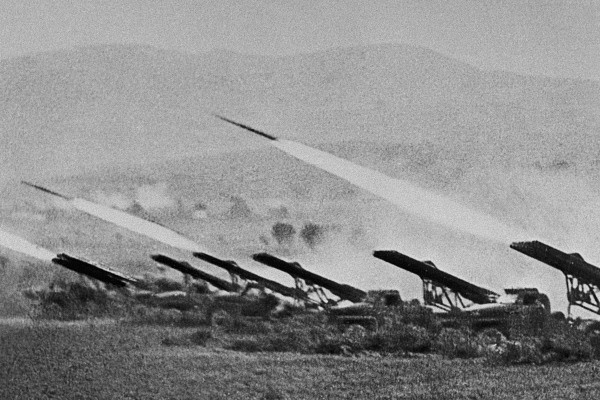 “Katyusha firing” A battery of Katyusha rocket launchers firing at the enemy, German forces, during the Battle of Stalingrad in 6 October 1942
“Katyusha firing” A battery of Katyusha rocket launchers firing at the enemy, German forces, during the Battle of Stalingrad in 6 October 1942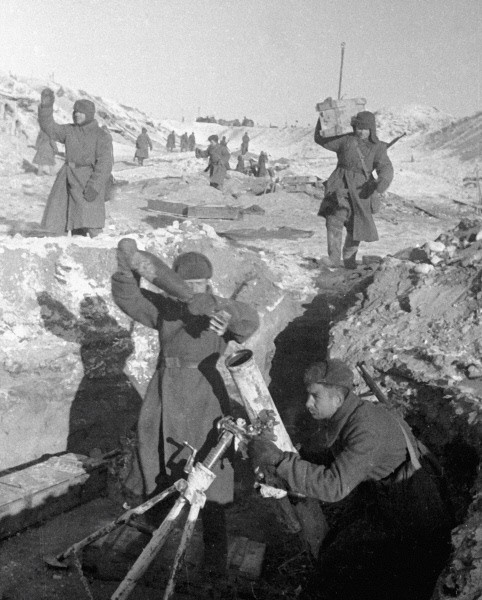 “Soldiers from Bezdetko’s mortar battery”. Soldiers from Bezdetko’s battery of regimental 120mm mortars firing at German positions.
“Soldiers from Bezdetko’s mortar battery”. Soldiers from Bezdetko’s battery of regimental 120mm mortars firing at German positions.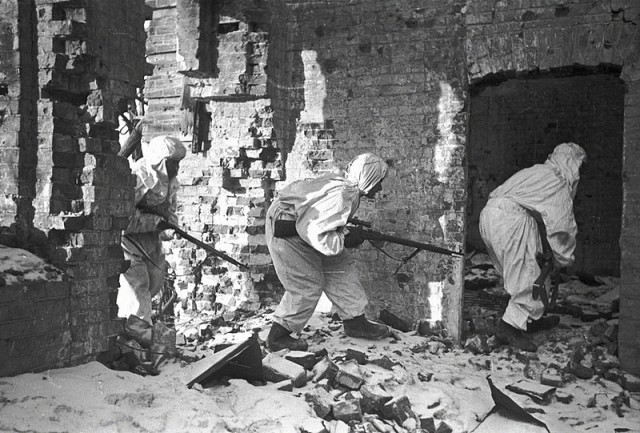 “Snipers”. Snipers in camouflage cloaks entering a destroyed house.
“Snipers”. Snipers in camouflage cloaks entering a destroyed house.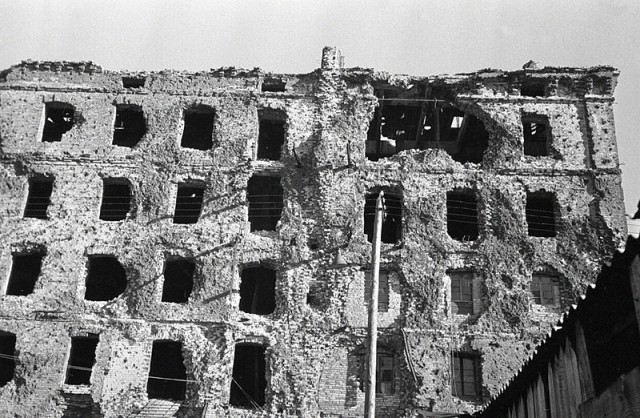 “Mill Gerhart”. Mill Gerhart after the Battle of Stalingrad
“Mill Gerhart”. Mill Gerhart after the Battle of Stalingrad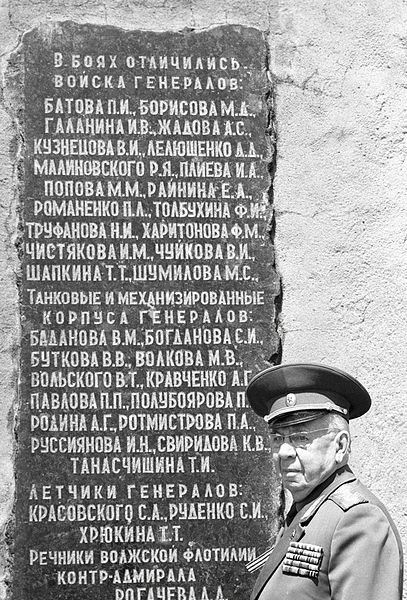 “General Borisov”.
General Mikhail Borisov at the memorial plaque with his name. The
plaque of the Mamayev Kurgan memorial complex bears the names of units
and commanders that distinguished themselves in the Battle of
Stalingrad.
“General Borisov”.
General Mikhail Borisov at the memorial plaque with his name. The
plaque of the Mamayev Kurgan memorial complex bears the names of units
and commanders that distinguished themselves in the Battle of
Stalingrad.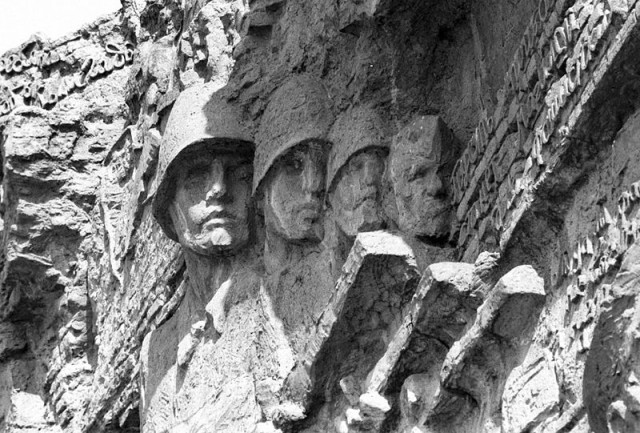 “To Heroes of the Battle of Stalingrad” monument-ensemble”. Bas-relief fragment of “To Heroes of the Battle of Stalingrad” monument-ensemble at the Mamayev Kurgan in Volgograd
“To Heroes of the Battle of Stalingrad” monument-ensemble”. Bas-relief fragment of “To Heroes of the Battle of Stalingrad” monument-ensemble at the Mamayev Kurgan in Volgograd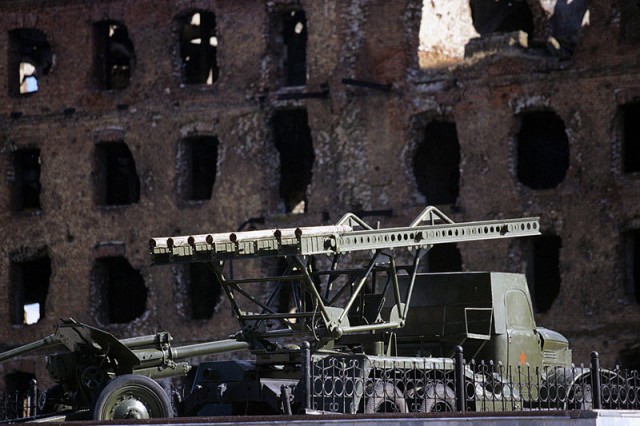 “Exhibits at panoramic museum “Stalingrad Battle””. Exhibits at panoramic museum “Stalingrad Battle”: fragment of a destroyed mill and weapons.
“Exhibits at panoramic museum “Stalingrad Battle””. Exhibits at panoramic museum “Stalingrad Battle”: fragment of a destroyed mill and weapons.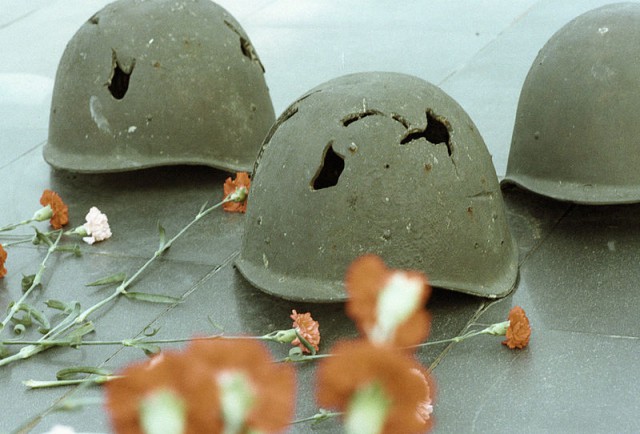 “Soviet soldiers’ helmets riddled by shells on the Mamayev Hill Memorial.”. Soviet soldiers’ helmets riddled by shells on the Mamayev Hill Memorial in Volgograd (former Stalingrad).
“Soviet soldiers’ helmets riddled by shells on the Mamayev Hill Memorial.”. Soviet soldiers’ helmets riddled by shells on the Mamayev Hill Memorial in Volgograd (former Stalingrad).All pictures and captions come from the RIA Novosti archive / Wikipedia

Δεν υπάρχουν σχόλια:
Δημοσίευση σχολίου